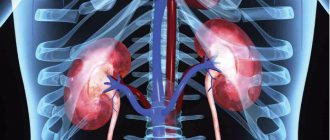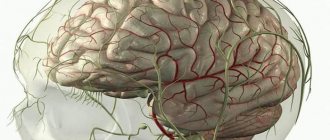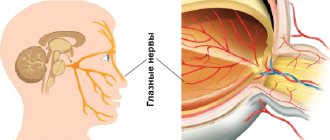Nervous
In the human body, the nervous system plays a leading role in regulating the functioning of all organs and systems of our body.
In addition, it is the basis of the psyche, that is, it is the soil (or matter) on which mental functions develop: perception, thinking, memory, emotions, will, personal characteristics. The state of the nervous system and psyche directly determines the health of the entire body. A healthy nervous system and psyche ensure the normal functioning of the entire body.
Disorders and diseases of the nervous system provoke diseases of internal organs, determine susceptibility to infectious diseases, allergic reactions, and affect the body’s ability to regenerate and recover.
«Nervous soil
“It is customary to call any painful symptoms or healthy manifestations in the body caused by changes in the mental sphere.
Doctors even identified a whole direction in medicine and a whole group of diseases caused by disturbances in the functioning of the nervous system - psychosomatics. Psychosomatic diseases include a large list of pathological conditions:
- hypertension,
- bronchial asthma,
- irritable bowel syndrome,
- eczema,
- obesity or pathological thinness,
- hyperthermia of central origin (increase in temperature), etc.
That is, all these disorders arise on a “nervous basis”.
Many normal (that is, not painful) physical sensations in the body, familiar to everyone, have a mental origin and develop on a “nervous basis.”
The most common of them: a feeling of heaviness in the chest or in the “solar plexus” area during excitement; feeling of a warm wave when experiencing pleasure; or “cold down the spine” with fear; dry mouth, palpitations, shortness of breath, “internal trembling”, weakness, restlessness, urge to go to the toilet, itching, etc.
Asthma, panic, dizziness
Today, doctors have studied in as much detail as possible the influence of the nervous system on human health and have even been able to identify a list of diseases that cause its activity. So, today they call “diseases from nerves”:
Article on the topic
Nerve diseases. What is psychosomatics and how to deal with it?
- bronchial asthma,
- irritable bowel syndrome,
- increased blood pressure,
- headache,
- dizziness,
- panic attacks.
This list is explained quite simply. Under stress, blood vessels spasm, blood flows more actively, and breathing quickens. And if there is any predisposition, for example, sensitivity to allergens (for bronchial asthma) or disruptions in the digestive system, everything can end in failure. And all of these systems are the most susceptible to stressful situations and are quite vulnerable, so that any quarrel or conflict can disrupt their work.
Article on the topic
On nerves. How to prevent stress from becoming a disease
Frequently asked questions
Is it true that if a person has been in a state of nervous tension for a long time, he becomes more susceptible to various diseases? Can a nervous condition lead to illness?
Doctors' observations say that an initially mentally and physically healthy person is able to endure prolonged or severe stress without subsequent complications in the form of illnesses.
But if the body already has its own “weak points” in the form of a predisposition to diseases, disorders in the early (not yet identified) stages, or is weakened by a disease, then overstrain of the nervous system can trigger a whole cascade of ailments. Frequent examples of such developments are the formation of hypertension, weight loss or gain after stressful events.
Is it true that all “diseases are from nerves”?
Many diseases have causes and mechanisms of development in the form of disorders of the nervous system and psyche. But it is not correct to say that “all diseases are from nerves.” There are other causes for diseases: genetic defects, infections and poisonings, injuries, there are many disorders with an undetected etiology.
Can internal diseases cause mental disorders?
Yes. Body and psyche are connected. A significant part of diseases of internal organs can contribute to behavioral disorders and lead to mental illness.
For example, atherosclerosis and hypertension, if left untreated and progressing, will cause encephalopathy and psychoorganic syndrome (decreased memory, intelligence, emotional instability). Insufficiency of the thyroid gland leads to a decrease in intellectual capabilities.
What diseases arise from nerves? Interview with a psychotherapist
During a corporate party in one metropolitan company, a tipsy boss jokingly put his palm on the neckline of his subordinate. The joke turned out to be bad. The woman reacted painfully to her boss’s prank and experienced serious stress. And soon, at the site of the touch, she began to develop neurodermatitis (a disease accompanied by itching, peeling of the skin with the formation of scabs from scratching). No medications could help the woman, and then it became clear that she needed the help of a psychotherapist - the woman’s illness was of a psychosomatic nature.
Oleg Chaban, Doctor of Medical Sciences, Professor, Head of the Department of Medical Psychology, Psychosomatic Medicine and Psychotherapy of the A. Bogomolets National Medical University, President of the All-Ukrainian Association of Psychosomatic Medicine, told Vesti about this. A woman with neurodermatitis was his patient, and as a result, the unpleasant symptoms were eliminated.
— Psychosomatic diseases are diseases the causes of which are more mental processes than any direct physiological causes. So, are all diseases caused by nerves?
- Yes, of course, there is some truth in this, but everything is much more complicated than we imagine. When we say “all diseases are from nerves,” we understand that a person as an individual and as a person is a single whole. There is a brain, there is a nervous and endocrine system, there is innervation of all organs and systems, and, naturally, all this is interconnected.
“But if the body is attacked by a virus or bacteria, and they set about their dirty work, then, regardless of the characteristics of our psyche, we will get sick. Perhaps with varying degrees of severity...
— Let’s imagine that you were attacked by the SARS-CoV-2 virus, which causes the disease Covid-19. It would seem like a respiratory disease... But this is not at all the case. In addition to the immune response, the nervous system includes its own specific mechanisms. The formula “all diseases are from nerves” in a more strict interpretation can be represented as a chain: what happens around a person is sociogenesis, his psychological characteristics are psychogenesis and pathology in his body is pathogenesis. Sociogenesis is tension and imbalance around a person. A person begins to interact with the world through stress. These are cortisol and adrenaline emissions, to which the body responds, in particular, with vasospasm. Eventually, vascular spasm can become permanent, and this is arterial hypertension. That is, at first the spasm arose as a reaction to external stimuli, then it took hold: there is no aggressive environment, but blood pressure is higher than normal.
— I think a whole bunch of such diseases can be found in everyone who is 50+...
- There are studies that show that psychosomatics is also the inclusion of a genetic factor, approximately 30%, life circumstances - approximately 60%. Of these, education in early childhood is about 20%, social factors of today are the rest. Therefore, the expression “all diseases are from nerves” is our entire life, which logically leads to one disease or another.
— Something like slalom, where the flags represent all sorts of threats to the body and personality. But how can you bypass these flags?
— It’s difficult, of course. To begin with, we realize that the genetic factor in psychosomatic diseases is only 30%, and everything else is acquired during life, including in early childhood.
- How to protect children?
— Do not instill in them acquired helplessness, but cultivate stress resistance and psychological flexibility. Childhood is a part of life, and encounters with “flags” (in the terminology you suggested) will appear later in adulthood.
— We go through the route of life only once, mistakes (both parental and our own) are inevitable. So, each of us carries some kind of psychosomatics within us?
- In principle, yes, just like, for example, we will all turn out to be allergic when we find (and there is) “our” allergen.
— What diseases most often cause suspicion of a psychosomatic component?
— First of all, these are diseases of the cardiovascular system, in particular arterial hypertension, which I have already given as an example. It is directly related to our fears, to our reaction to stress. In addition: coronary heart disease, gastric ulcer, diabetes mellitus. Nowadays, oncological pathology is also linked to psychosomatic mechanisms, when a person subconsciously enters a situation where life has stopped - helplessness, lack of goal settings, etc. Gastroentorological and sexual dysfunctions are also associated with psychosomatics.
- But how do you know when it’s time to see a psychotherapist?
- If there is no effect with the correct treatment of a biological problem, such as arterial hypertension, if the disease is aggravated by anxiety or stress; if stability is achieved in the treatment of the underlying disease, but a feeling of malaise and fatigue remains. Well, if an obvious emotional disorder is added to the underlying illness: phobias, depression, a consultation with a psychotherapist is necessary. And this should be seen by the attending (family) doctor.
— Many people are still afraid of psychiatrists and psychotherapists, especially the former, who are associated with the prescription of powerful antidepressants, sedatives...
— Psychotherapists do not use medications to treat patients. If there is severe depression or suicidal tendencies, then, apparently, the patient needs both antidepressants and a hospital. However, psychiatry is becoming increasingly outpatient. But now we are not talking about big psychiatry, but about psychosomatics. Such patients go to cardiologists, gynecologists, gastroenterologists, and so on. So, in case of suspicion of the psychosomatic nature of the disease, joint work of a specialist with a psychotherapist is useful.
- But how can you not get carried away by soul-searching, searching for psychosomatic manifestations in yourself?
— It’s very simple: prohibit yourself from self-diagnosis. If only because you can’t be objective about yourself. The psychologist himself is the same as the dentist himself: painful, biased and, most importantly, no result. If soul-searching leads to the conviction that, after all, you need to contact a specialist, this will be the right decision.
The material was published in the Vesti newspaper dated June 24, No. 111. You can purchase the full issue of the Vesti newspaper at press distribution outlets or subscribe online.
Nervous symptoms and pain
The most common symptoms and complaints, that is, they can arise from “nerves”:
- insomnia, early and frequent awakenings, difficulty falling asleep, daytime sleepiness,
- lack of air, feeling of incomplete inspiration, increased breathing,
- a wave of heat or cold throughout the body, chills,
- feeling of inner trembling,
- palpitations, arrhythmia,
- headache, pain of any localization,
- feeling of heaviness in the chest or other localization,
- lump in the throat, feeling of a foreign body in the throat,
- anxiety, melancholy, apathy,
- obsessive fears, doubts, movements,
- floods of thoughts,
- obsessive feelings of guilt or resentment,
- increased or decreased body temperature,
- weight gain (obesity), weight loss (cachexia), weight fluctuations,
- increase or decrease in blood pressure, pressure surges,
- skin rashes of any shape and location,
- nausea, vomiting, abdominal discomfort, diarrhea or constipation,
- frequent urge to urinate, feeling of a full bladder, difficulty urinating,
- trembling, feeling of “internal trembling”,
- feeling of numbness in any part of the body,
- loss or increased perception of taste, light, smell, sounds, touch,
- decreased memory or excessive memorization,
- attention disorders,
- increased tearfulness or lack of feelings and emotions,
- aggressiveness, resentment, rancor, vindictiveness, heightened sense of justice, jealousy,
- decrease or increase in volitional activity.
These complaints may be a consequence of a malfunction of the nervous system (that is, arise from nervousness). However, such symptoms can also manifest themselves in ordinary somatic diseases (inflammation, trauma, dystrophy, vascular disorders, infections, etc.).
Therefore, even if you are faced with the presence of several symptoms from this list at once, you cannot draw a conclusion about the presence of “nervous soil”. Such a conclusion can only be made by a doctor who will examine, clarify the condition and determine the diagnosis.
Diseases of the gastrointestinal tract and nerves: how are they interconnected?
Which gastrointestinal diseases are psychosomatic in nature, that is, they begin to develop after strong experiences or stress.
“I can’t digest it”, “What an ulcer!”, “Bileful statement” - these expressions very clearly demonstrate how gastrointestinal diseases are associated with human emotions and psychology. Many gastrointestinal diseases are psychosomatic in nature, that is, they begin to develop after strong experiences or stress. Irina Pichugina , candidate of medical sciences, gastroenterologist, psychiatrist, specialist in the field of psychosomatics, explains how this happens.
The trigger for diseases of the gastrointestinal tract is often stress - acute or chronic. I cannot say that all the psychological problems of my patients stem from childhood or that everyone has long-term emotional stress.
For example, one of my patients could name the exact time when he fell ill - on New Year's Eve he quarreled with his wife, left home and wandered around the cold streets of Moscow all night. In the morning he returned, reconciled with his wife, but for another 2 years he could not recover.
What processes in the body trigger the disease?
The most ancient system of our body is the vegetative one. It protects us from changing influences, maintaining the constancy of the body's composition and function. However, at a certain point, with an increase in stress load, a failure may occur in the autonomic nervous system.
At this moment, protection sharply decreases and damage occurs in one or another organ. The fact is that each person has his own “weak spot,” which is determined by hereditary factors and is formed during life. Having identified it, we can begin to talk about the “somatization” of the process or about a psychosomatic illness.
Psychosomatic diseases include the following diseases of the gastrointestinal tract:
- Esophagospasm
- Irritable bowel syndrome
- Biliary dyskinesia
- Peptic ulcer
- Ulcerative colitis
In addition, stress plays an important role in the pathogenesis of many other diseases. Anxiety often leads to increased motility and an increase in the amplitude of contractions of the gastrointestinal tract. But depression, on the contrary, is accompanied by decreased motor skills, weakened speed and amplitude of contractions.
It turns out that before taking medications, you need to understand the psychological background of the disease?
Yes, the key to successful recovery is solving psychological problems. For example, many patients with irritable bowel syndrome who take a large number of medications and follow a diet often report a complete absence of symptoms on vacation if it is at sea. The man went to rest, completely relaxed, and the disease subsided. I returned to work, became nervous again, and the symptoms returned again.
That is, you need to change your life somehow?
Treatment of each case of psychosomatic illness is, of course, a personalized approach and a lot of work by the patient himself.
Treatment of psychosomatic illness must be comprehensive:
- It is necessary to normalize the daily routine;
- It is very important to get up and go to bed at the same time, try to eat according to a certain schedule;
- Diet plays an important role in the recovery process. It will have its own characteristics in each individual case;
- Be sure to take short breaks while working;
- Don’t forget about physical activity - walks in the fresh air, exercise, sports. In addition, every day you need to do something pleasant for yourself. Often our favorite things are put off until later, and we only focus on our responsibilities.
A healthy lifestyle will also help cope with psychosomatic illness. Management of a psychosomatic illness with a specialist must be combined with a psychologist, psychiatrist and psychotherapist. There are different types of counseling and treatment available:
- Psychotherapy
- Treatment with psychopharmacological drugs
The drugs are prescribed in courses, taking into account the side effects and needs of the patient, his emotional disorders, and the characteristics of the gastrointestinal tract. Therefore, such treatment must be prescribed by a doctor. There are a large number of solutions for active patients that will allow them not to disrupt their usual lifestyle. Only with the right integrated approach can a psychosomatic illness be overcome.
They say that all diseases are caused by nerves...
Kirill Stasevich “Science and Life” No. 12, 2016
...This is true to a certain extent if by “nerves” we mean stress - a complex reaction of the body in response to force majeure circumstances. To overcome them, stress mobilizes our internal resources, but it is impossible to live in a state of constant mobilization, and chronic stress, which the body cannot cope with, turns out to be harmful to us.
Even if stress is purely psychological, it is not limited to the nervous system, provoking a whole range of physiological reactions. And when they began to look for connections between stress and physiological consequences, they turned to the immune system, namely the inflammatory response. Inflammation is one of the body’s ways of protecting itself: if an infection appears in the body or its own cells are destroyed and die, then in response, immune cells located near the source of infection or wound release many signaling molecules. As a result, blood vessels become more permeable, the tissue swells with fluid, and new groups of various immune cells come to the problem area. This does not give us the most pleasant sensations - everything hurts, swells and itches, but in the end the wound heals and the infection disappears.
It happens, however, that inflammatory processes occur inappropriately. They do not develop to their full potential, but a small inflammation slowly smolders in the depths of healthy, uninfected, undamaged tissues and slowly causes harm there.
Abnormal immune activity occurs for various reasons, and the harm from it also varies. Two years ago in the journal Cell Metabolism
An article was published describing how inflammation links obesity and diabetes: it turns out that excess fat causes the cells that store it to secrete a certain protein, which completely in vain activates immune cells. The resulting inflammatory reaction reduces the sensitivity of body tissues to insulin, and it is this insulin resistance that underlies type 2 diabetes. It is known that atherosclerotic deposits on the walls of blood vessels, which impair the blood supply to organs up to the point of heart attack, also develop with the active participation of the immune system and inflammatory signals. There is evidence that inflammation increases the likelihood of getting some types of cancer.
There is a lot of work that talks about the relationship between psychological stress and inflammation and its consequences. In Nature Medicine
two years ago an article was published that stress can lead to atherosclerosis. In an experiment, mice whose cages were regularly turned over, the lighting regime changed, and generally not allowed to live quietly, had an increase in the level of immune cells—neutrophils and monocytes. The immediate cause of this was the hormone norepinephrine, the concentration of which increases under stress. When norepinephrine entered the bone marrow, it contacted local service cells, which determine the development path of blood stem cells. As a result, due to norepinephrine, the bone marrow began to produce a lot of neutrophils with monocytes, and they play a large role in the inflammatory response and are often present in atherosclerotic plaques. When the effect of norepinephrine on the bone marrow was blocked in mice, the number of these immune cells fell and, most importantly, the number of plaques on the walls of blood vessels decreased.
Another example involves the brain: earlier this year, researchers at Ohio State University published the results of experiments in which mice were subjected to social stress by introducing a larger, more aggressive “guest” to them. Stress affected the behavior of animals - mice became anxious, avoided social contacts, but, in addition, the rodents began to have memory problems, and fewer nerve cells appeared in the hippocampus, which serves as one of the main memory centers. If the animals were given anti-inflammatory drugs, their memory problems disappeared (although depressive behavior persisted).
These works are just two examples from a huge body of research. But what will we see if we move from mice to people?
Doctors are well aware of increased levels of inflammation in people under stress. The inflammatory background can be assessed by molecular markers, immune proteins that transmit signals between cells of the immune system. Stress often leads to neuropsychiatric disorders such as depression, and the connection between inflammatory signals and stress can even be used in diagnosis. A few years ago, Massachusetts General Hospital reported that they had created a diagnostic test that could detect depression using a blood test, specifically nine inflammatory biomarkers. Often mentioned among the characteristic immune proteins that accompany stress is interleukin-6, which is believed to indicate a certain likelihood of diabetes and cardiovascular disease. One of the latest works on this topic is an article by researchers from Rice University, published in June on the website of the journal Psychoneuroendocrinology
. It talks not so much about stress itself, but about the peculiarities of the nervous system, which can lead to a depressed mental state. Thus, the inability to maintain attention on something for a long time, increased distraction to extraneous stimuli increase general anxiety, and after it the level of inflammatory interleukin-6, which leads to disruption of carbohydrate metabolism - blood sugar rises, and this is a direct threat of diabetes. On the contrary, if the nervous system can “control itself,” that is, does not twitch for any reason, then both the level of inflammation and the likelihood of diabetes will be low.
Here, however, it is worth clarifying that inflammation itself can increase sensitivity to stress and aggravate depression, which is again confirmed by both animal experiments and clinical studies. It turns out to be a real vicious circle: the stress that provoked the inflammatory reaction, because of it, intensifies, and when intensified, it stimulates inflammation even more.
But stress is a rather special concept; usually we talk about what specifically worries us - loneliness, quarrels with loved ones, etc. It is more difficult to study such situations than conducting an experiment with mice, but it is still possible. The fact that social rejection stimulates inflammation was written in 2012 in Clinical Psychological Science.
researchers from the University of British Columbia. For two and a half years they watched teenage girls. They were periodically asked how things were going “in society”: whether they encountered hostility or indifference, how they assessed their social status, etc. At the same time, they checked the content of substances indicating inflammation, and it turned out that after cases of social rejection the level inflammatory signals in girls increased, and increased even more than in any other stressful situations. The higher the assessment of one’s own social status, the higher the assessment of one’s own social status, the higher the immune response to social problems, that is, the most sociable people and leaders of companies are much more worried if they suddenly discover that someone is not paying attention to them. Even if they think they don’t notice it, their immune system will still react.
But especially interesting were the results of researchers from Ohio University, who found out how loneliness in general affects the immune system. Here we will make a small digression and remind you that the notorious inflammation is used as a weapon in the fight against pathogens. While nothing threatens the body, it only causes harm, but during an infection, ready-made inflammation will probably come in handy. However, as it turned out, despite the inflammation, despite the increased level of interleukin-6 in lonely people, their body fights viruses worse. That is, prolonged psychological stress affects the immune system in such a way that inflammation only causes harm and does not bring any benefit (at least in the case of a viral infection).
But happiness, on the contrary, helps the immune system. However, happiness is too capacious a word; it would be more correct to talk here about a feeling of pleasure. This feeling can be associated with a variety of things - it appears when some physiological needs are satisfied, and it also occurs when important life goals are achieved. From a neurobiological point of view, the feeling of pleasure is born in the brain’s reward system - this is the name given to a group of interconnected nerve centers, which include both some zones of the cortex and subcortical areas. (However, it is believed that these centers serve not so much pleasure itself as its anticipation, anticipation, therefore the reinforcement system determines our motivation, helps us choose a goal and achieve it.)
One of the key parts of the reward system is the ventral tegmental area, which is part of the midbrain. Researchers from the Technion Institute of Technology in Israel stimulated neurons in the ventral tegmental area in mice, and then took immune cells from the animals and added pathogenic strains of E. coli to them. It turned out that immune cells, after activating the reinforcement system, are twice as effective in killing microbes: both on their own, in the form of a cell culture, and in the body of other, ordinary mice to which they were transplanted.
Further experiments showed that the ventral tegmental area influences immunity through the sympathetic nervous system. This is the name of the department of the autonomic (or autonomic) nervous system, whose task is to support the work of internal organs in a mode autonomous from the brain (the brain itself, if the need arises, can interfere with the work of the autonomic nervous system). One of the tasks of the sympathetic department is to react to any stress: it mobilizes the body’s forces for vigorous activity, increases metabolism, etc. Stress is associated with danger: there is a high risk of getting wounded and becoming infected with something, so it is logical that the sympathetic nerve centers activate the immune system too. What does the reinforcement system have to do with it? Moreover, she feels when an individual is about to experience some kind of pleasure, be it food or sexual contact. But both are also associated with the danger of infection. It was the possible connection between pleasure and danger that led to the fact that in the course of evolution the reward system began to influence the immune system. The pleasures of a modern person in most cases are rarely associated with something dangerous, but the immune system is still activated just in case. The full results of the experiments were published in a July article on the website of the journal Nature Medicine
.
Interestingly, one of the reasons that prompted researchers to investigate whether pleasure could influence immunity was the placebo mystery. It is known that the placebo effect is associated with the reinforcement system. When we take medications, we understand that we are being treated and expect that everything will soon go as it should. If, under the guise of a real medicine, you give a dummy pill (that is, a placebo), the sensations will be the same and the anticipation of future recovery can be seen through the reinforcement system. The placebo effect sometimes actually helps with illness, perhaps precisely because of the stimulating effect of the reward system on the immune system.
But being constantly happy is not always possible for everyone. And in order to break the vicious connection between “nerves” and inflammation, I would like to have some more reliable pharmacological agent on hand. It is quite possible to create it if we learn in detail about all the molecular mediators between stress nerve signals and immunity.
Immune signals, including inflammatory ones, have already been relatively well studied. (We talked about one of these signals, the interleukin-6 protein, above.) However, there are still quite a lot of them, they respond to a variety of stimuli, and here it is necessary to understand whether there is any purely “nervous” specificity in the inflammatory response . There is a lot of fruitful work on this topic in the sector of neurogenetics of social behavior at the Institute of Cytology and Genetics of the Russian Academy of Sciences, headed by Doctor of Biological Sciences Natalia Nikolaevna Kudryavtseva. His collaborators are studying how social experience and genetic factors together affect the state of the body and how this manifests itself at the molecular level and in behavior. On the one hand, they were able to identify changes in genetic activity in different areas of the brain caused by social stress. On the other hand, it has been shown that psychological stress, which occurs when an area is overcrowded or when it is necessary to constantly sort things out with competitors, affects different “floors” of the immune system.
For example, in male mice that have been socially disadvantaged for a long time, cell division slows down in the thymus, or thymus gland, where maturation, differentiation and immunological “training” of T cells occur. Aggression, provoked by constant clashes with neighbors, changes the proportions of B and T cells in the immune organs. Depending on the presence of different membrane receptors, B and T cells (of which there are many varieties) perform different tasks. The predominance of certain B and T cells changes the state of immunity. As N. N. Kudryavtseva and her colleagues write in the Russian Physiological Journal, in mice under conditions of social stress the balance of cells changes in such a way that this may indicate autoimmune processes, when the immune system mistakenly begins to attack the body’s own cells and tissues. The situation can be partially corrected with the help of interleukin-2, a signaling protein that teaches immune cells to distinguish “strangers,” that is, an infection, from “their own.” In another article, also published in the Russian Journal of Physiology, the authors claim that they were able to see a weak positive effect of roncoleukin (a commercial form of interleukin-2) on the immune system of stressed animals.
It may be possible in the future to find more effective drugs that will suppress the inflammatory and autoimmune effects of stress not only in mice, but also in humans.
Photo by Natalia Domrina










